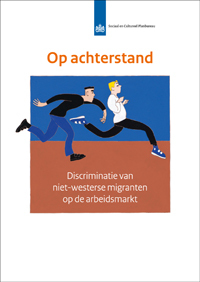In his most recent column Egbert Alejandro Martina elaborates on the issue of institutionalized racism in the Netherlands and the distinctions made between so-called “white” and “black” schools and assumptions which go with these.
Source: http://processedlives.wordpress.com/2013/07/11/on-the-use-of-the-word-blanke/
“I always find it odd when White Autochtoon Dutch folk use, when referring to their skin colour and/or “race,” the adjective “blanke” instead of “white.” This rhetorical move made me wonder why White Autochtoon Dutch people refer to themselves as “blank” instead of “white.”
Analyses of “social problems” tend to problematize the “Other” in relation to White Autochtoon Dutch norms, and differences in social position are often expressed in binary terms of black and white: it’s witte school versus zwarte school (White school versus Black school) and witte wijk versus zwarte wijk (white neighbourhood versus black neighbourhood). However, when it comes to race it’s “blank” versus “zwart.” There’s an interesting dynamic going on between “blank” and “wit” in which it seems “blank” is reserved for categorizing people. To me, “blanke” is a depoliticized term to refer to White people.

Discrimination of non-Western migrants on the job market
This image suggests that our lagging behind is due to our own constitution/stamina; the noticeably blonde runner – both runners are gendered male – is simply better (he’s running effortlessly). Notice the colour coding of the shirts.
In Dutch political language it’s “wit,” i.e. “white,” that has political weight. “Wit” in political and popular language is systematically coded as more desirable; white neighbourhoods and schools are considered better and safer. Clearly, being “white” (non-black) is favoured and it comes with certain privileges. Trouw recently reported that,
“Primary schools structurally refuse pupils on the basis of ethnic origin. This is made possible by way of non-transparent, “unfair” [Trouw’s scare quotes] admission procedures and is done out of fear that the schools might turn “black.”
The fear of contamination (of the school turning “black”) provides a powerful rationale and justification for these discriminatory measures and this fear depends on the social meanings that “black” or “blackness” triggers. “Black” and “blackness” are associated with poor education, delinquency, criminality, violence, poverty: in short, the problems that plague society. In Dutch political language, “black” is a catch-all term to denote everything that is undesirable, foreign and dangerous. Blackness, and by extension the black body, performs a symbolic role in the Dutch political landscape.
“Black” schools, however, aren’t schools with a predominantly Black student body. They are schools where the student body consists of predominantly non-Western Allochtonen, which according to the criteria of the CBS refers to anyone “originating from a country in Africa, South America or Asia (excl. Indonesia and Japan) or Turkey.” By labelling schools and neighbourhoods that are “under-performing” black, or allochtoon, these spaces (and the problems associated with these spaces) get racialized.
Nell Irvin Painter writes in Why White People are Called ‘Caucasian’ that “the function of the general concept of race is to establish and maintain hierarchical boundaries in human taxonomy, even when the categories are not “black” and “white”. Race is a social, not a biological, reality. However, as Trica Danielle Keaton notes,
“public and popular discourses in France (as elsewhere) conflate ordinary, everyday language with technical or scholarly concepts of “race” for which there is no universally agreed upon understanding or definition. Thus, “color,” held as a visible feature of “race,” comes to be semantically indistinguishable, similar to discrimination and racism, while exercising considerable influence on peoples’ assigned and asserted identities.”
Despite its long colonial history and its changing demographics, the Netherlands still perceives itself as being in character, in structure, in culture a “white, Autochtoon, Dutch” country. Consequently, people of colour and Eastern Europeans face structural boundaries and constrictions set by the White Autochtoon Dutch majority.
Yet, there are still White Autochtoon Dutch people who argue that one’s intentions should determine whether something can be considered racist, or not – even though, racist intentions are extremely difficult to divine and prove in specific instances. Moreover, it’s well-documented that “implicit bias can affect people’s decisions and their behavior toward people of other races.” Besides, placing emphasis on intentions suggests that racism operates solely on an individual level, and not an institutional level.
But I want to come back to the “black” and “white” binary, or rather the “blanke” and “neger” binary. Blanke and neger are not equivalent opposites. There’s not a history of dehumanization attached to “blanke.” In addition, they don’t even belong to the same class of words. Contrary to popular opinion, “neger” is not descriptive, it’s ascriptive. Neger is a noun, an assigned category. If anything “blanke” is descriptive.
Even though, blank and Wit are synonyms, they are, too, not equivalent, or interchangeable. Blankperforms a different rhetorical and political work. To foreground blank when referring to “race” is to obscure the political work “white” (which goes beyond merely being a “reference to difference in skin colour”) performs in Dutch political language: the spatialization of race (see alsoAntillianengemeenten, so-called “Antillean municipalities”). Moreover, “blank” upholds (and strengthens) the myth of Whiteness as being blank, unmarked and valueless. As recent exchanges on Twitter have highlighted, White Autochtoon Dutch people perceive themselves not only as racially and culturally neutral, but also as being able to speak from an “objective position,” a position which is not informed by their experience as (gendered, classed) people coded as White, Autochtoon and Dutch.
By the same token, arguments advancing the neutrality of “neger” (and “zwarte”), or a definition of “neger” that’s strangely disconnected from its history, for instance, deny (or minimize) the Dutch race-making past of which anti-blackness and the word “neger” are products.”
Read more here: http://processedlives.wordpress.com/


Pingback: Spreker op aankomend KSU/Basta! debat over Zwarte Piet bedreigd | Nieuws | Kritische Studenten Utrecht